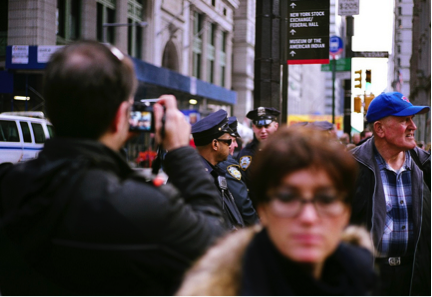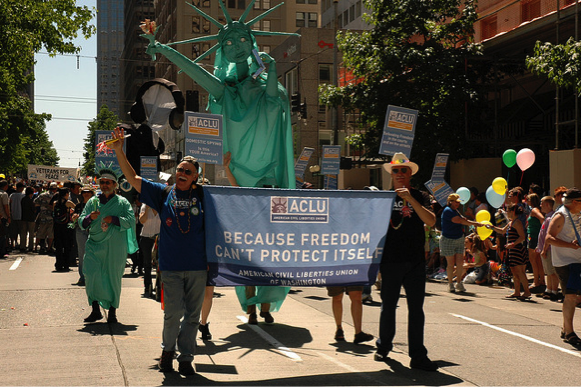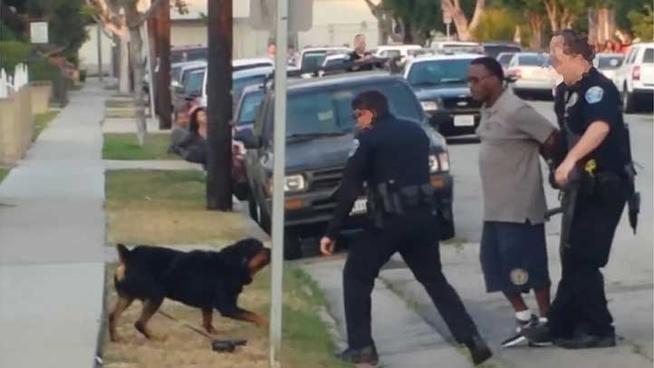Bystanders Struggle With Legality Of Filming Police
A Texas House Representative introduced a bill last week that would make it illegal to film police within 25 feet. Only approved media outlets would be allowed to film up close. The bill as it stands would even prevent people from recording their own arrests.
And now lots of people are pissed.
The bill’s author, Rep. Jason Villalba (R-Dallas), said the legislation was largely written by outside police groups. He’s promised to redraft it to address civil liberty concerns. But the kerfuffle over Villalba's proposal is yet another chapter in a long-standing battle over the right to film police.
Camera phones give us an ugly front row seat to some of the world’s most disturbing events. We can see all the beheadings we want, whenever we want. We can watch teenagers knock each other out. We can even film our own suicides.

While we’re put off by how brutal people can be, we’re also able to see injustice where we didn’t before. Imagine how some of the country’s darkest moments might have played out if citizens were able to capture what they were seeing.
Police officers rarely seem to be able to see the benefits from the other side of the camera lens.
A Cameroonian man was shot by Los Angeles police officers on Skid Row in downtown Los Angeles earlier this month. The camera phone footage, shot by a bystander, sparked local outrage and international attention. None of this attention would have existed without that four minutes and five seconds of mobile video.
But as we've seen with Eric Garner, videos of officer-involved shootings do not guarantee justice.
Citizens have been harassed, detained and attacked for recording police during run-of-the-mill interactions. The act of filming police in public is protected by the First Amendment, but that right is often violated. Criminal charges against police rarely result in convictions.
“It’s notoriously difficult to try to sue police officers, because you typically have to show that an officer knew he was doing something wrong at the time that he did it,” said John W. Bussman, a criminal lawyer based in Southern California.
Bussman notes that while police are oftentimes aware of the law, there are unwritten rules citizens must follow to avoid confrontation.
“If you’re trying to provoke a reaction from the police, don’t be surprised if you succeed.”
Sometimes proving you aren’t a threat isn’t enough. A Pennsylvania woman and her disabled daughter were arrested in their home last February after an officer told the mother “it’s against the law to tape without my permission.”
She was filming while on her property. She and other family members told the officer he had no right to enter the home, to which the officer replied, “I do.”
The officer’s actions were a violation of the First and Fourth Amendments. The woman sued the police department.
Abie Kyle Ikhinmwin was arrested while filming a police speed trap, she told San Antonio news station KENS5. Ikhinmwin told reporters she was recording while waiting for a bus with her bike.
She said an officer passing by parked and approached her, demanding that she move the bike onto the curb. Ikhinmwin complied, only to be told by the officer that she’d committed a traffic violation.

The United States Court of Appeals, First Circuit tacitly affirmed citizens’ right to film police in Gericke v Begin. In a May 2014 ruling, the court stated that filming police in public spaces is protected by the First Amendment, so long as filming doesn’t interfere with police business.
The ruling does leave some gray area.
“Reasonable restrictions on the exercise of the right to film may be imposed when the circumstances justify them,” the court states.
“…a police order that is specifically directed at the right to film police performing their duties in public may be constitutionally imposed only if the officer can reasonably conclude that the filming itself is interfering, or is about to interfere, with his duties.”
Reasonably is a powerful word. While the right to video record police activity has been affirmed by the courts, the word "reasonably" means civilians can be stripped of that right if both the police department and the courts deem that officer’s actions reasonable. This is hampered by the fact that states also draft their own equally vague laws.
California Penal Code Section 148(a) 1 is the state’s “resisting arrest law.” The law prohibits citizens from resisting, delaying, or obstructing police officers. According to SHouse California Law Group, a criminal law firm, obstruction can include things like jeering.
“Cops can always find a reason to take you to jail, and 148(a) 1 is one of those catchalls,” said Bussman.
He explained that police argue in front of a judge that tasks that should have taken a short amount of time took much longer because a citizen interfered.
“You don’t have a right to waste a cop’s time.”
The Illinois Supreme Court only recently overturned the state’s wiretapping law, which said that all parties being audio recorded must be made aware of the recording. The law was extended to public servants in public places. Massachusetts also had a broad wiretapping law on the books as of 2011. The U.S. 1st Circuit Court ruling that struck down that law set by the precedent for Gericke v. Begin.
But even as the courts start to define the boundaries of when it is acceptable to film police, the number of people detained for recording law enforcement offiicals continues to increase with the proliferation of smartphones.

Videos surfaced that showed Rosby more than 50 feet away from police officers. As officers approach him, he turns his back to them and surrenders.
Rosby’s dog was in the car while he was being handcuffed. The dog eventually got so agitated that he jumped through a car window and started barking loudly and moving toward the arresting officers.
One officer then shot and killed the dog.
“You’d be amazed at what I’ve been through over the last two years,” said Rosby. “I was a coach at Hawthorne elementary. I own a business in Hawthorne. I’m a model citizen, or at least I thought I was.”
Rosby faced criminal charges after two witnesses said he threatened to kill them if they talked to police. He was eventually found not guilty of dissuading a witness, but still faces other less serious charges.
“It’s not that police officers are bad. It’s just that there are some of them that are bad and corrupt.”
Police officers deal with regular harassment while doing their jobs. People heckle them, throw things at them and threaten them. Agitating police can turn a routine traffic stop into a federal appeals court case. That's because while police are trained on how to diffuse situations, run-of-the-mill taunting can sometimes feel like a threat.
“We’re always twisting our heads,” said John, a retired Chicago Police Department officer who requested his last name be withheld. People with cameras film police from behind, creating a potentially dangerous situation for an officer who’s working alone.
“If you want to be here, you’ve got to be behind the guy I’m talking to, so I can watch him and I can watch you,” said John.
Trying to question someone who just showed up without identifying themselves can lead to all kinds of trouble, he said. Police will oftentimes call backup in these situations.
John also said that police aren’t always trained specifically on how to deal with people with cameras. While they receive additional training throughout their career, these trainings are grouped under sensitivity training. This means some officers may genuinely not know that filming police is legal.
Officers who aren’t aware of a law are legally protected if they break it, but John said officers rarely get away with crimes based on that technicality. “They’re charging police nowadays for battery,” he said.
Police are also punished for breaking internal policy, he continues. Punishment can range from a verbal warning to being dismissed from the force.
Officers in Omaha were charged with felonies after taking and disposing of the memory card from the cell phone of someone recording them. Several of those charges were dropped to misdemeanors. Four of the officers were fired, while others were reinstated or had their charges dropped entirely.
These charges received so much national attention because people weren’t used to seeing police do time.
The ACLU posted a photo online of an officer in an orange jumpsuit and wrote: “I hope that police see this image and realize that this is what can happen.”
While it’s encouraging to see justice done, police violate the First and Fourth Amendment far too often. If you want to film police, go for it. Just don’t be surprised if you end up in a cell.
Email Staff Reporter Jonathan Tolliver here. Reach him on Twitter here.



